Tianwei Xing
MobiVital: Self-supervised Time-series Quality Estimation for Contactless Respiration Monitoring Using UWB Radar
Mar 14, 2025Abstract:Respiration waveforms are increasingly recognized as important biomarkers, offering insights beyond simple respiration rates, such as detecting breathing irregularities for disease diagnosis or monitoring breath patterns to guide rehabilitation training. Previous works in wireless respiration monitoring have primarily focused on estimating respiration rate, where the breath waveforms are often generated as a by-product. As a result, issues such as waveform deformation and inversion have largely been overlooked, reducing the signal's utility for applications requiring breathing waveforms. To address this problem, we present a novel approach, MobiVital, that improves the quality of respiration waveforms obtained from ultra-wideband (UWB) radar data. MobiVital combines a self-supervised autoregressive model for breathing waveform extraction with a biology-informed algorithm to detect and correct waveform inversions. To encourage reproducible research efforts for developing wireless vital signal monitoring systems, we also release a 12-person, 24-hour UWB radar vital signal dataset, with time-synchronized ground truth obtained from wearable sensors. Our results show that the respiration waveforms produced by our system exhibit a 7-34% increase in fidelity to the ground truth compared to the baselines and can benefit downstream tasks such as respiration rate estimation.
Learning to Compress Prompt in Natural Language Formats
Feb 28, 2024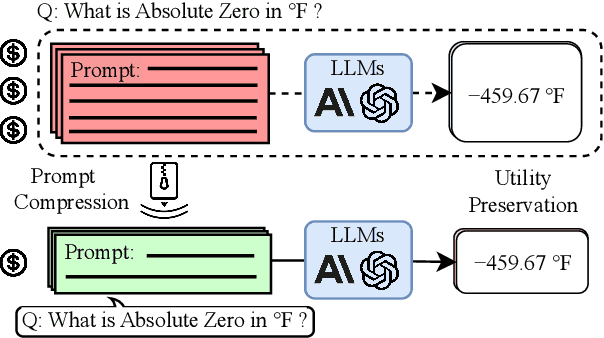


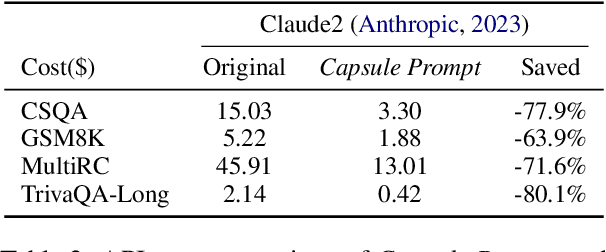
Abstract:Large language models (LLMs) are great at processing multiple natural language processing tasks, but their abilities are constrained by inferior performance with long context, slow inference speed, and the high cost of computing the results. Deploying LLMs with precise and informative context helps users process large-scale datasets more effectively and cost-efficiently. Existing works rely on compressing long prompt contexts into soft prompts. However, soft prompt compression encounters limitations in transferability across different LLMs, especially API-based LLMs. To this end, this work aims to compress lengthy prompts in the form of natural language with LLM transferability. This poses two challenges: (i) Natural Language (NL) prompts are incompatible with back-propagation, and (ii) NL prompts lack flexibility in imposing length constraints. In this work, we propose a Natural Language Prompt Encapsulation (Nano-Capsulator) framework compressing original prompts into NL formatted Capsule Prompt while maintaining the prompt utility and transferability. Specifically, to tackle the first challenge, the Nano-Capsulator is optimized by a reward function that interacts with the proposed semantics preserving loss. To address the second question, the Nano-Capsulator is optimized by a reward function featuring length constraints. Experimental results demonstrate that the Capsule Prompt can reduce 81.4% of the original length, decrease inference latency up to 4.5x, and save 80.1% of budget overheads while providing transferability across diverse LLMs and different datasets.
Using DeepProbLog to perform Complex Event Processing on an Audio Stream
Oct 15, 2021
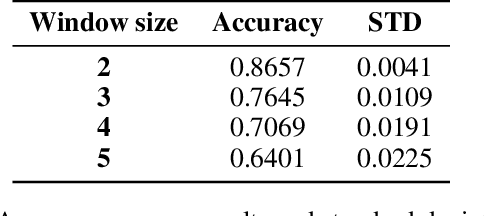
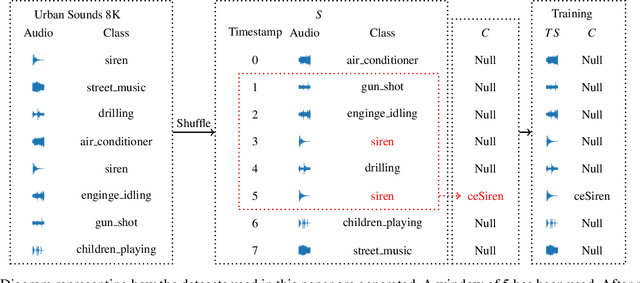
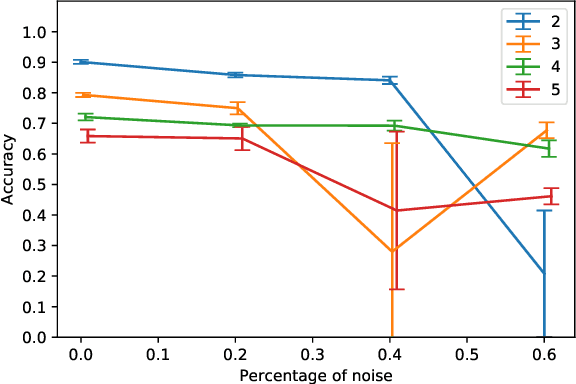
Abstract:In this paper, we present an approach to Complex Event Processing (CEP) that is based on DeepProbLog. This approach has the following objectives: (i) allowing the use of subsymbolic data as an input, (ii) retaining the flexibility and modularity on the definitions of complex event rules, (iii) allowing the system to be trained in an end-to-end manner and (iv) being robust against noisily labelled data. Our approach makes use of DeepProbLog to create a neuro-symbolic architecture that combines a neural network to process the subsymbolic data with a probabilistic logic layer to allow the user to define the rules for the complex events. We demonstrate that our approach is capable of detecting complex events from an audio stream. We also demonstrate that our approach is capable of training even with a dataset that has a moderate proportion of noisy data.
An Experimentation Platform for Explainable Coalition Situational Understanding
Nov 09, 2020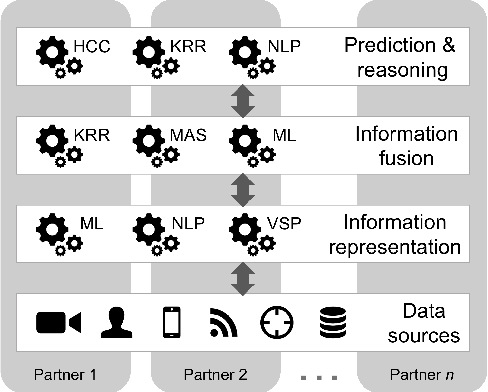
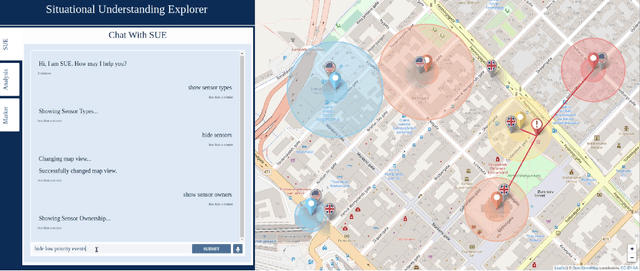
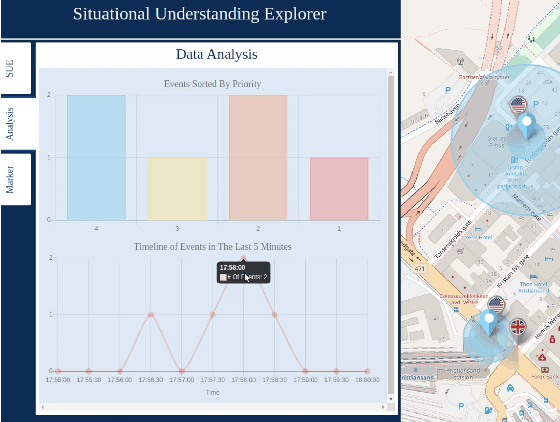
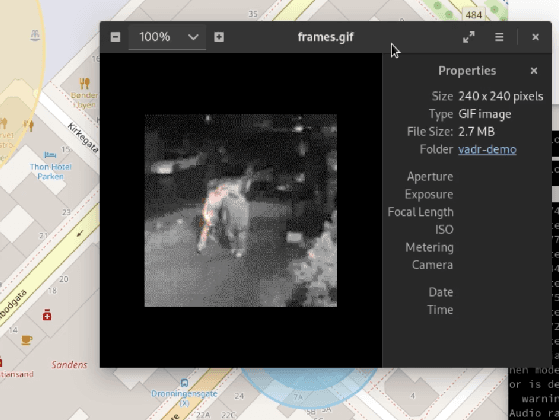
Abstract:We present an experimentation platform for coalition situational understanding research that highlights capabilities in explainable artificial intelligence/machine learning (AI/ML) and integration of symbolic and subsymbolic AI/ML approaches for event processing. The Situational Understanding Explorer (SUE) platform is designed to be lightweight, to easily facilitate experiments and demonstrations, and open. We discuss our requirements to support coalition multi-domain operations with emphasis on asset interoperability and ad hoc human-machine teaming in a dense urban terrain setting. We describe the interface functionality and give examples of SUE applied to coalition situational understanding tasks.
A Hybrid Neuro-Symbolic Approach for Complex Event Processing
Sep 18, 2020
Abstract:Training a model to detect patterns of interrelated events that form situations of interest can be a complex problem: such situations tend to be uncommon, and only sparse data is available. We propose a hybrid neuro-symbolic architecture based on Event Calculus that can perform Complex Event Processing (CEP). It leverages both a neural network to interpret inputs and logical rules that express the pattern of the complex event. Our approach is capable of training with much fewer labelled data than a pure neural network approach, and to learn to classify individual events even when training in an end-to-end manner. We demonstrate this comparing our approach against a pure neural network approach on a dataset based on Urban Sounds 8K.
Binarized Convolutional Neural Networks with Separable Filters for Efficient Hardware Acceleration
Jul 15, 2017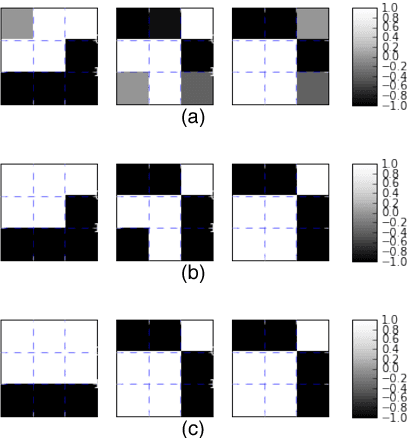
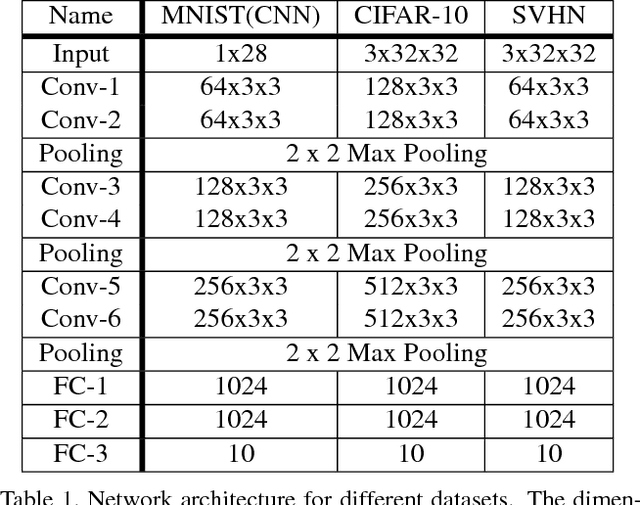
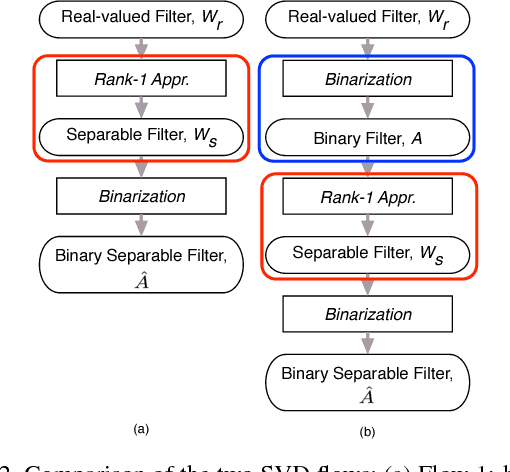

Abstract:State-of-the-art convolutional neural networks are enormously costly in both compute and memory, demanding massively parallel GPUs for execution. Such networks strain the computational capabilities and energy available to embedded and mobile processing platforms, restricting their use in many important applications. In this paper, we push the boundaries of hardware-effective CNN design by proposing BCNN with Separable Filters (BCNNw/SF), which applies Singular Value Decomposition (SVD) on BCNN kernels to further reduce computational and storage complexity. To enable its implementation, we provide a closed form of the gradient over SVD to calculate the exact gradient with respect to every binarized weight in backward propagation. We verify BCNNw/SF on the MNIST, CIFAR-10, and SVHN datasets, and implement an accelerator for CIFAR-10 on FPGA hardware. Our BCNNw/SF accelerator realizes memory savings of 17% and execution time reduction of 31.3% compared to BCNN with only minor accuracy sacrifices.
Personalized Course Sequence Recommendations
Jan 12, 2016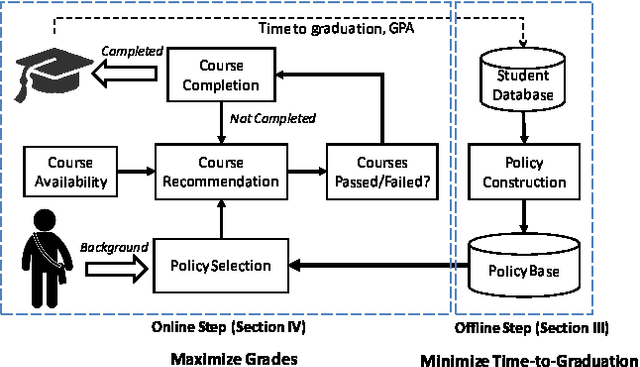
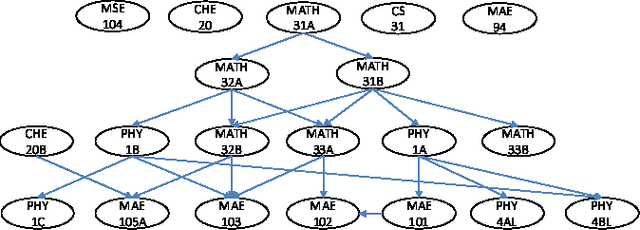
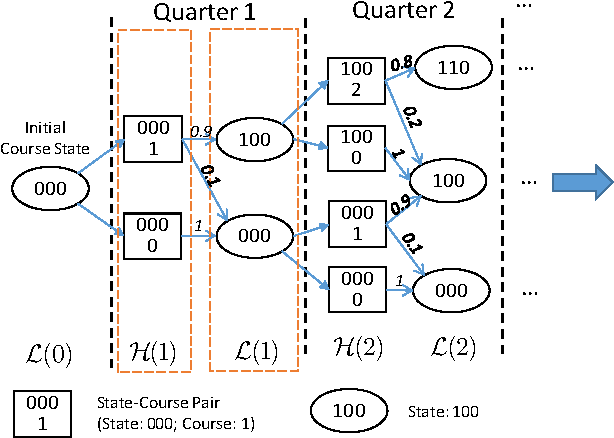
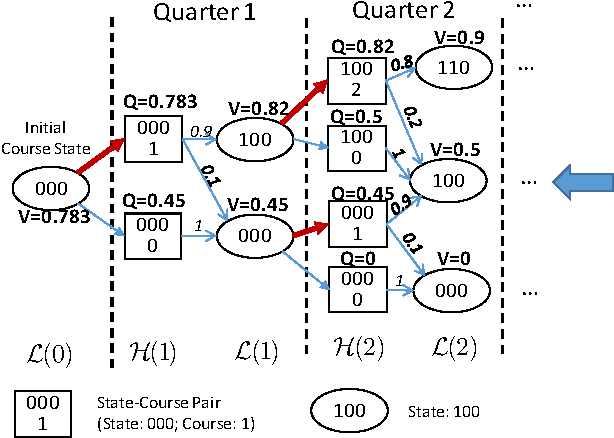
Abstract:Given the variability in student learning it is becoming increasingly important to tailor courses as well as course sequences to student needs. This paper presents a systematic methodology for offering personalized course sequence recommendations to students. First, a forward-search backward-induction algorithm is developed that can optimally select course sequences to decrease the time required for a student to graduate. The algorithm accounts for prerequisite requirements (typically present in higher level education) and course availability. Second, using the tools of multi-armed bandits, an algorithm is developed that can optimally recommend a course sequence that both reduces the time to graduate while also increasing the overall GPA of the student. The algorithm dynamically learns how students with different contextual backgrounds perform for given course sequences and then recommends an optimal course sequence for new students. Using real-world student data from the UCLA Mechanical and Aerospace Engineering department, we illustrate how the proposed algorithms outperform other methods that do not include student contextual information when making course sequence recommendations.
 Add to Chrome
Add to Chrome Add to Firefox
Add to Firefox Add to Edge
Add to Edge